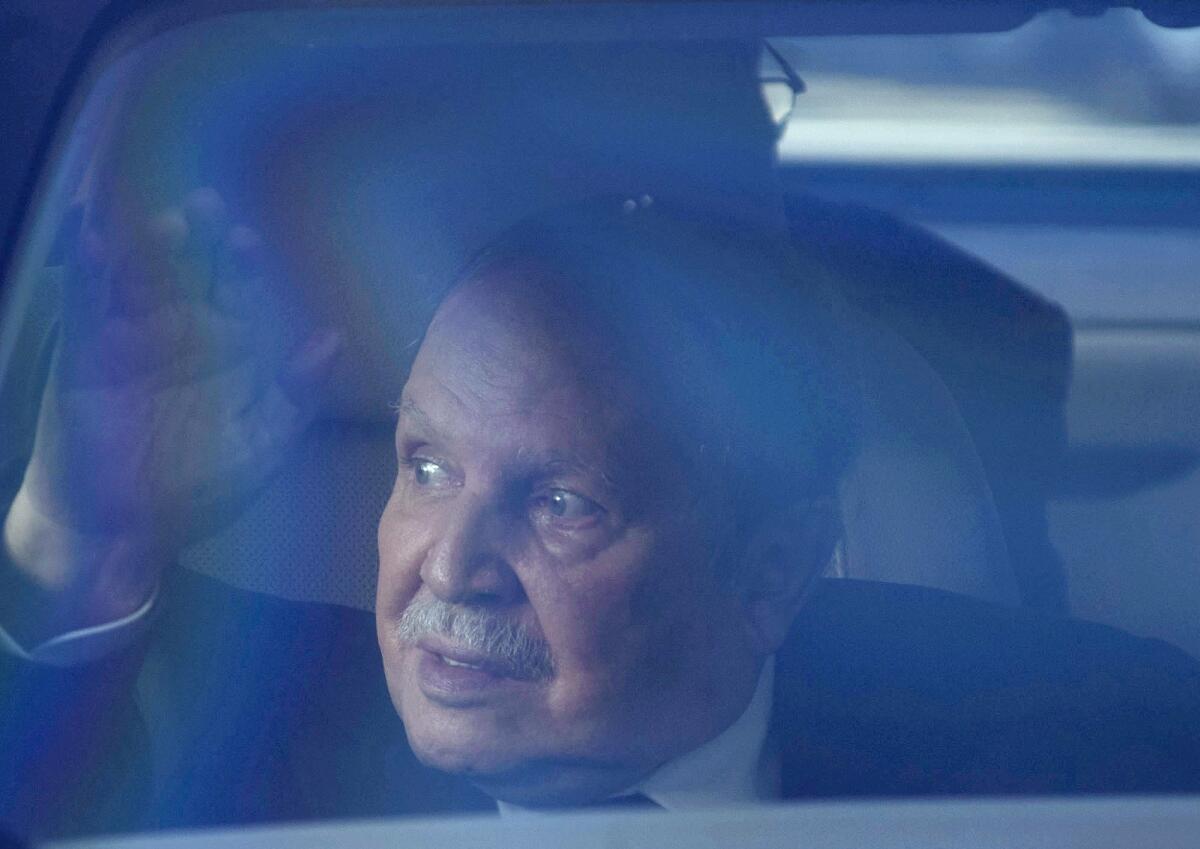Algeria president’s fourth term likely despite health, opposition

- Share via
Algeria’s longtime President Abdelaziz Bouteflika appears a shoo-in to win reelection during the national vote scheduled for April 17, despite concerns about his health and criticism of the government’s strict control.
Bouteflika, who has been in power since 1999, has made few television appearances during his presidential campaign, which has brought into question his physical ability to stay at the helm. In addition, opponents have criticized the Algerian leadership, saying the country is run by oligarchs from the ruling National Liberation Front and army generals.
But the 77-year-old president maintains staunch support in part because he presided over the end of the civil war that erupted in the early 1990s after the success of an Islamist party led the army to intervene in elections. The brutal conflict, involving the military and Islamic militants, left tens of thousands of Algerians dead.
Bouteflika supporters view him as capable of ensuring stability for the North African nation amid upheaval in the region. Algerian officials announced in February that Bouteflika, who has been recovering from a stroke he suffered last year, planned to seek a fourth five-year term.
The president easily won the vote in 2009. Government critics, however, consider elections unfair with state institutions under Bouteflika’s control.
Amara Benyounes, a Bouteflika campaign official, said in an interview Sunday with a French television station that the president could continue leading the country. Algeria gained independence from France in 1962.
“His health is steadily improving,” Benyounes said, and “his head works very well.”
Bouteflika survived the so-called Arab Spring that began in December 2010 and resulted in several revolts in the region, including government changes in Egypt, Libya, Tunisia and Yemen.
Shortly after the uprisings, Algeria – a beneficiary of oil and gas resources – took pre-emptive initiatives to appease the public, such as increasing subsides on food and implementing pay increases. A recent report by the International Monetary Fund showed that the unemployment rate in Algeria fell from 29.5% to 10% between 2000 and 2011.
Bouteflika is one of six presidential candidates this year. Analysts say the others have little chance of winning, though there have been recent signs of government opposition.
On Saturday, Bouteflika’s campaigners canceled a rally after opponents stormed the venue in the eastern Kabylie region. On Wednesday, demonstrators threw stones at the Algerian prime minister’s motorcade during a campaign event, the Associated Press reported.
There have been several such incidents in recent weeks but the country has not seen a large-scale political movement against the Bouteflika government, said Imad Mesdoua, a political analyst with the Mintz Group investigative services firm.
“Protests in the capital, Algiers, were initially suppressed by police,” Mesdoua said in an email interview. “The government and Bouteflika loyalists have repeatedly targeted [protesters], labeling them as either ‘agents of foreign interference’ or ‘importers of Arab Spring-style instability.’”
And many Algerians, particularly young people, have not shown great interest in the election, he said.
“Most [Algerians] are more interested in day-to-day bread and butter issues, such as youth employment and housing,” Mesdoua said, “and don’t really feel represented by any of the political parties in the political scene.”
Tarek, a reporter from Cairo, is a visiting journalist at The Times sponsored by the Daniel Pearl Foundation in partnership with the Alfred Friendly Press Fellowships.
–
More to Read
Sign up for Essential California
The most important California stories and recommendations in your inbox every morning.
You may occasionally receive promotional content from the Los Angeles Times.










